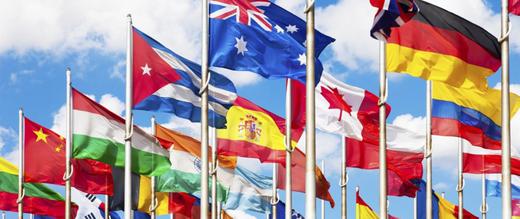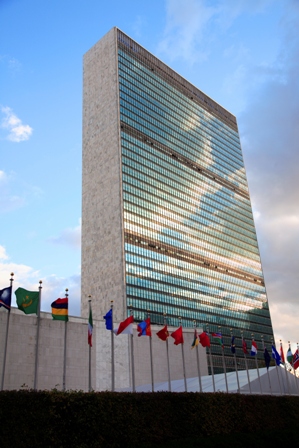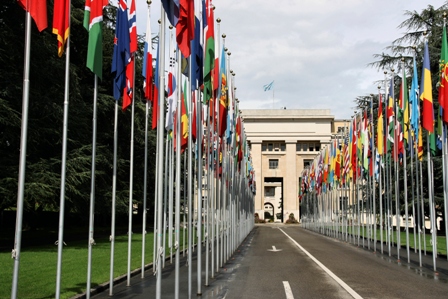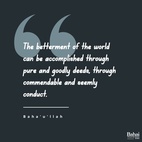The views expressed in our content reflect individual perspectives and do not represent the official views of the Baha'i Faith.
Today, October 24th, marks the celebration of United Nations Day around the world. Baha’is in every country observe and celebrate this unique day, and work toward the realization of world unity.
The Baha’i teachings call upon humanity to establish a truly representative international government:
True civilization will unfurl its banner in the midmost heart of the world whenever a certain number of its distinguished and high-minded sovereigns — the shining exemplars of devotion and determination — shall, for the good and happiness of all mankind, arise, with firm resolve and clear vision, to establish the Cause of Universal Peace. They must make the Cause of Peace the object of general consultation, and seek by every means in their power to establish a Union of the nations of the world. They must conclude a binding treaty and establish a covenant, the provisions of which shall be sound, inviolable and definite. They must proclaim it to all the world and obtain for it the sanction of all the human race. This supreme and noble undertaking — the real source of the peace and well-being of all the world — should be regarded as sacred by all that dwell on earth. All the forces of humanity must be mobilized to ensure the stability and permanence of this Most Great Covenant. In this all-embracing Pact the limits and frontiers of each and every nation should be clearly fixed, the principles underlying the relations of governments towards one another definitely laid down, and all international agreements and obligations ascertained. – Abdu’l-Baha, The Secret of Divine Civilization, p. 64-65.
This vision – the beautiful Baha’i principle of universal democracy and the Parliament of Man, what Abdu’l-Baha calls “the daystar of the firmament of true civilization and the cause of the glory, the advancement, the well-being and the success of all humanity” – forms the primary goal of every Baha’i. And while the current structure of the United Nations does not match that egalitarian ideal, and while some believe global governance cannot be achieved, the Baha’i writings urge everyone to work continuously and diligently toward the goal of a united world:
A few, unaware of the power latent in human endeavor, consider this matter as highly impracticable, nay even beyond the scope of man’s utmost efforts. Such is not the case, however. On the contrary, thanks to the unfailing grace of God, the loving-kindness of His favored ones, the unrivaled endeavors of wise and capable souls, and the thoughts and ideas of the peerless leaders of this age, nothing whatsoever can be regarded as unattainable. Endeavor, ceaseless endeavor, is required. Nothing short of an indomitable determination can possibly achieve it. – Abdu’l-Baha, The Secret of Divine Civilization, p. 65.
That “indomitable determination” has led humanity toward world unity and global governance through many a test and trial. Our two most destructive wars both impelled world leaders to come together to form international bodies. In fact, U.S. President Franklin Delano Roosevelt coined the name “United Nations” in 1942, during the Second World War, as representatives of 26 nations pledged their Governments to continue fighting together against the Axis Powers and the Nazi threat.
Historically, the United Nations became possible only after a long history of international cooperation between nations on specific matters. One of the first global organizations, the International Telegraph Union (now the International Telecommunication Union) was founded two years after the Baha’i Faith began, in 1865, and the Universal Postal Union was established in 1874. (Both are now United Nations agencies.)
In 1899, the International Peace Conference was held in The Hague to elaborate instruments for settling crises peacefully, preventing wars and codifying rules of warfare. It adopted the Convention for the Pacific Settlement of International Disputes and established the Permanent Court of Arbitration, which began work in 1902. It also became the precursor for the Central Organization for a Durable Peace, which Abdu’l-Baha addressed in his Tablet to The Hague, encouraging the participants to adopt the Baha’i model of world peace and the oneness of all nations.
After the carnage of the First World War, several nations conceived the forerunner of the UN, the League of Nations, and established it in 1919 under the Treaty of Versailles “to promote international cooperation and to achieve peace and security.” But the League of Nations ceased its activities after it failed to prevent the Second World War.
In 1945, representatives of 50 countries met in San Francisco at the United Nations Conference on International Organization to draw up the United Nations Charter. Once the majority of its founders had ratified its Charter, the United Nations officially came into existence 68 years ago on 24 October 1945, born of that “indomitable determination” for world unity Abdu’l-Baha recommended we all develop.



















Comments
Sign in or create an account
Continue with Facebookor